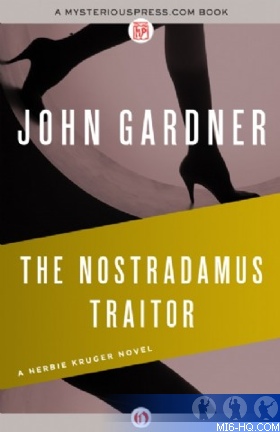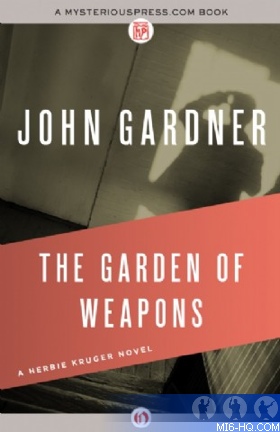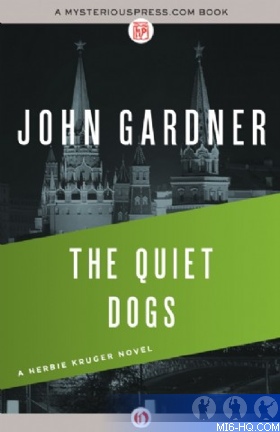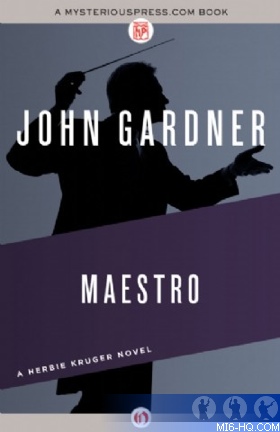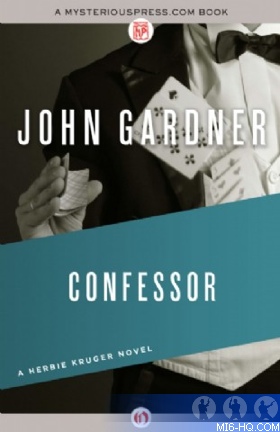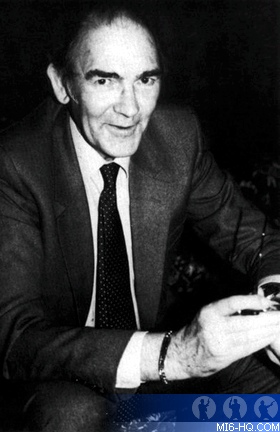Herbie Kruger - Review
15th September 2013
Edward Biddulph reviews a series of five novels by continuation author John Gardner that chart the more modest exploits of another spy: Herbie Kruger
On first reading, Herbie Kruger is a spy cut from a shabbier cloth to the fine tailoring of Ian Fleming's James Bond. John Gardner's anti-hero is more like what we imagine to be a real spy. He lives in the murky world of deception and suspicion, he works for an organisation riven with mistrust, resentment and incompetence, and his weapons are interrogation and solid, old-fashioned spycraft.
During the time he was licensed to continue James Bond's adventures, John Gardner completed five Herbie Kruger novels, beginning with "The Nostradamus Traitor", published in 1979, and finishing with "Confessor" in 1995. Kruger also appears in two novels from another of Gardner's series. As one reads the books now, the spectre of James Bond looms large. For many, spying and Bond are synonymous, and inevitably Bond now provides the archetype with which Kruger and all other spies must be compared. For Gardner, his Kruger series was overshadowed by the success of his own Bond novels. This is a shame, because the Herbie Kruger novels are very good and deserve to be more widely read.
Herbie Kruger is an unlikely-looking spy. He is a large, lumbering man with a lumpy face and stupid grin. He wears crumpled suits long past their prime. Of German origin, he confuses, amuses and irritates his colleagues as he mangles the English language. But appearances are deceptive, and behind the persona is a shrewd, intelligent, steely man who charms the ladies and outwits his enemies. But work is not everything, and every spy has a hobby. Both Bond and Kruger like their drink, but whereas Bond's other hobby is cars, Kruger's is the composer Gustav Mahler, whose music gives Kruger solace and space to reflect and plan his next moves.
|
Gardner's first offering, "The Nostradamus Traitor", is in a way atypical of the Kruger series, as Kruger is for much of the book peripheral to the narrative. Kruger - Big Herbie to his colleagues - runs a successful intelligence-gathering network in East Germany for MI6. When a German woman seeks information about her husband's execution at the Tower of London for spying during the Second World War, Big Herbie is called to investigate. His enquiries lead him to George Thomas, now a legend in MI6, but during the war an agent for Special Operations Executive. Through Big Herbie's gentle but skilful interrogation, Thomas reveals all about his role in an SOE plot to spread disinformation and discord among the Nazi high command by planting fabricated prophesies by seer Nostradamus. But far from being ancient history, the events have terrible repercussions for MI6.
Readers who like their spy fiction to be more George Smiley than James Bond will not be disappointed, but nor will those who prefer a healthy dose of Fleming-style thrills. Gardner pulls off the trick of combining both styles, as the moral ambiguities, unspoken conflicts, and the chess-game procedures of the modern-set passages are interleaved with the daring heroics, thrilling gun-play, absurd villainy and seductive beauties of the wartime events. There is even a villain's lair that would not be out of place in the pages of Fleming's adventures.
"The Garden of Weapons" (1980), John Gardner's second Kruger novel, is a more conventional spy story. A captain in the KGB defects to Britain from East Germany. He asks for Big Herbie, who, during his interrogation of the defector, learns of a double agent within his East German intelligence network. Against orders, Kruger travels to Berlin and through the Berlin Wall to root out the traitor. What awaits him is a trap and a deadly encounter with his arch enemy, a high-ranking KGB officer.
|
Superficially the novel is far removed from the world of Bond, but careful reading reveals some pleasing nods to Bondian tropes. Before setting off for Berlin, Kruger visits the technical expert in Stores to be issued with a homing device and other gadgets, disparagingly viewed by Kruger as 'movie business'. In the manner of Fleming, Gardner describes the food Kruger consumes in some detail, and elements of the novel's denouement has shades of Vesper's betrayal in "Casino Royale".
The book was followed by "The Quiet Dogs" in 1984. Four years after the Berlin débâcle, Kruger is washed out and broken, and is regarded with suspicion by his colleagues and the director of MI6. As much to test his abilities and loyalties as to use his considerable skills, Kruger is given the seemingly impossible task of extracting a long-term asset in Moscow - without leaving London. The parallels with Fleming's "You Only Live Twice" are obvious - in the book, M gives Bond, exhausted and depressed after the death of his wife, a diplomatic and intelligence-gathering task with little chance of success - and Bond also comes to mind when Kruger tucks into a plate of scrambled eggs and wears a microphone disguised as a pair of cufflinks. And like Bond in "You Only Live Twice", Kruger's mission becomes personal when he has the chance to destroy his "bête noir" and his Blofeld: the KGB officer who almost destroyed him four years earlier.
Gardner's final two Kruger novels were written after the fall of the Berlin Wall, and describe a secret service coming to terms with the end of the Cold War and redefining its role in the new world order. In "Maestro" (1993), Big Herbie investigates the nefarious past - and apparent Nazi connections - of a celebrated orchestral conductor, while in "Confessor" (1995), he uncovers the disturbing secrets of one of MI6's most effective interrogators (known colloquially as confessors).
|
The Herbie Kruger series is well-written and compelling, and the best of the novels - for me "The Nostradamus Traitor" and "The Quiet Dogs" - rank alongside the classics of Le Carré and Fleming. The books demonstrate Gardner's deep knowledge of the Cold War, espionage lore and spy fiction. This knowledge is perhaps masked in his Bond books, but it gives confidence that the typically heightened reality of the narratives of those novels are ground in reality. And any readers who prefer their spies to be dangerous, sophisticated, charming, and a more like, well, James Bond, are likely to be rewarded. There is a little bit of Bond even in Big Herbie.
Share The Story
The opinions expressed in this review are those of the author and do not necessarily reflect those of MI6-HQ.com or its owners.






